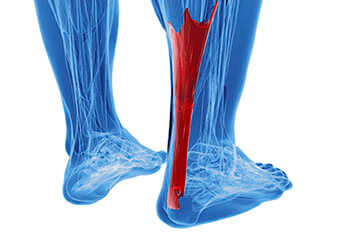Connect With Us
Achilles Tendon

Achilles Tendonitis Treatment in Dallas and Carrollton, TX
The Achilles tendon is a tough band of tissue that connects the calf muscles to the heel bone. It helps you walk by elevating your heel off of the ground. Although the Achilles tendon is very strong, it can also be a common site for injuries in the lower limbs.
Achilles tendon injuries are typically the result of overuse — a sudden increase of a repetitive activity that puts excess stress on the tendon. Activities that can lead to overuse injuries include running, jumping, playing certain sports, and working in a standing position for prolonged periods of time. People who have flat feet or an abnormal gait may also be more likely to develop Achilles tendon issues as their foot structure and walking pattern can put greater stress on the tendon.
There are several types of Achilles tendon injuries. Achilles tendonitis is an inflammation of the tendon and is usually an acute condition that comes on suddenly and then resolves. However, when Achilles tendonitis does not heal fully, Achilles tendinosis may develop. This type of injury is characterized by microtears appearing in the tendon, leading to a breakdown in its structure. In some cases, the Achilles tendon may even fully tear or rupture.
The symptoms of an Achilles tendon injury may include pain, aching, stiffness, soreness, and tenderness directly above the heel and below the calf muscle. The pain is often at its worst upon first arising in the morning or after taking your first few steps after a long period of rest. The pain may dissipate somewhat with activity but then worsen again if your activity level increases.
Treatment for an Achilles tendon injury depends on the type of injury, how long the injury has been present, and the degree of damage to the tendon. Less severe injuries may respond well to conservative measures such as resting and icing the affected foot, taking oral medications to reduce pain, wearing orthotics or immobilizing the foot, and doing strengthening exercises. Severe injuries that do not respond well to conservative treatments may require surgical intervention.
If you are experiencing the symptoms of an Achilles tendon injury or would like to learn about how to prevent one, please consult with a podiatrist.
